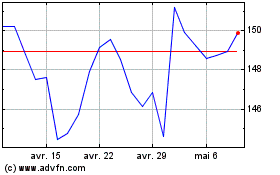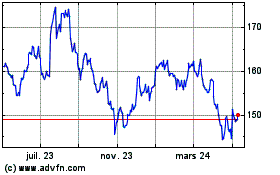By Betsy McKay and Peter Loftus
The Food and Drug Administration approved a controversial drug
for depression Tuesday that could be the first of a long-awaited
wave of new treatments, but has also raised concerns about
abuse.
The drug, a nasal spray that manufacturer Johnson & Johnson
has branded Spravato, is a close chemical relation to ketamine, an
anesthetic that is known for its heady effects on the brain. It is
often abused as a party drug with the nickname "Special K," but it
has also been shown in studies to have a fast-acting impact on
depression symptoms.
The FDA approved use of Spravato, to be taken with another
antidepressant such as Zoloft, for patients with
"treatment-resistant" depression, meaning they have been unable to
find relief from at least two treatments. The approval comes
despite mixed results in clinical testing, and the agency said
Tuesday that because of safety concerns, the drug will be available
only through a restricted distribution system. The FDA also said it
must be administered in a certified medical office where the
health-care provider can monitor the patient.
Spravato is one part of a renaissance in the development of new
and better treatments for depression, a crippling condition treated
mostly with drugs that are decades old. J&J estimates about
three million to five million Americans suffer from
treatment-resistant depression. No significant new class of drugs
has come on the market for depression in decades.
The discovery that ketamine can help ease symptoms of depression
-- and within hours, rather than the weeks required for
antidepressants such as Prozac or Zoloft -- has shaken up the field
of psychiatry. Ketamine targets a different receptor in the brain
and appears to have a more direct effect than those drugs.
"It really has opened up a whole new way of thinking about
depression," Gerard Sanacora, professor of psychiatry at Yale
University School of Medicine and director of the Yale Depression
Research Program, said of ketamine. Dr. Sanacora was an
investigator on some of J&J's clinical trials of Spravato.
But use of ketamine and related compounds must be monitored
closely, Dr. Sanacora said, to prevent supplies from being diverted
and sold on the street. For the past few years, ketamine has been
administered to some patients off-label intravenously. The new
product will be much more portable as a nasal spray.
The drug had mixed results in clinical testing. Spravato, also
known as esketamine, improved depression in two late-stage studies
compared with placebo. But the drug fared no better than placebo in
two others. A fifth study designed to assess safety in up to one
year of use found that the most common adverse events were
dizziness, dissociation, nausea and headache.
Julie Zito, a professor of pharmacy and psychiatry at the
University of Maryland, Baltimore, said more research should be
conducted to evaluate the drug in clinics in an ordinary community
setting, rather than under study conditions. She is one of two
members of an FDA advisory panel who voted last month against
approval of Spravato.
The FDA is requiring the drug's prescribing label to carry a
prominent warning about the risks of sedation and suicidal thoughts
and behaviors after administration of the drug.
Husseini Manji, global therapeutic head of neuroscience at
J&J's Janssen pharmaceutical unit, said the company expects
several hundred U.S. doctor's offices and clinics to offer the drug
within the first year.
J&J expects the Drug Enforcement Administration to classify
Spravato, like ketamine, as a Schedule III drug, deemed as having a
low to moderate potential for dependence. Other examples of
Schedule III drugs are anabolic steroids and certain doses of
codeine.
J&J said Spravato will cost between $590 and $885 per
treatment session, depending on the dose. For the standard regimen,
that will amount to $4,720 to $6,785 for the first month, and about
$2,360 to $3,540 a month thereafter. Dr. Manji said the company
expects most insurance plans to pay for the drug. Patients
currently pay hundreds of dollars for a ketamine infusion.
Ketamine and its chemical cousins act in a different way than
selective serotonin reuptake inhibitors, the class of drugs that
includes Prozac. Ketamine targets glutamate, the most abundant
chemical messenger in the brain, which carries signals between
brain cells.
At lower, or subanesthetic doses used to treat depression,
ketamine causes people to feel detached from reality, altering
their senses or making them feel spacey. Some people have
hallucinations, though these are rare, psychiatrists say. Those
effects wear off after the drug is administered, while the chemical
changes it induces relieve depression symptoms.
J&J made Spravato in nasal-spray form because it gets to the
brain more quickly than an oral formulation, and without the need
for an anesthesiologist with an IV, Dr. Manji said. Patients will
be expected to remain at the doctor's office after dosing to be
monitored for side effects like heightened blood pressure and
dissociation, which usually vanish within two hours.
Steven Levine, founder and chief medical officer of Actify
Neurotherapies, which offers ketamine infusions at clinics across
the country, said J&J's nasal spray could appeal to people who
have been put off by ketamine's reputation or who haven't been able
to afford the infusions. "Those who have been scared off by the
ketamine baggage will find this more approachable," he said.
He said he would continue to offer infusions, because some
payers may set stricter qualifications for coverage of the new
drug.
Gene Stull gets about three ketamine infusions a month at an
Actify Neurotherapies clinic in Princeton, N.J., paying $450 out of
pocket for each session.
The treatment, which he has been getting for three years, is
worth it, said the 73-year-old retiree. Multiple other depression
medications had failed to lift a "black cloud" of despair.
On each visit, he sits in a reclining chair, listens to country
music and sees black water rushing straight up out of his head. He
thinks of it as the ketamine "washing the depression out of my
head," he said.
The experience is "bizarre," but good, he said. "It's not creepy
or anything." He wants to try the nasal spray, which he hopes
Medicare will cover.
Allergan PLC is also developing a quick-acting antidepressant,
called rapastinel, which also targets the NMDA receptor. Results
from late-stage trials of the drug, which would be administered
once a week intravenously, are expected soon, the company said.
The market for drugs targeting the NMDA receptor is estimated to
reach $2 billion by 2025 and $3 billion by 2030, according to
research by analysts at Sanford C. Bernstein & Co.
Sage Therapeutics Inc. has applied for U.S. regulatory approval
for another rapid-acting drug -- albeit with a different mechanism
-- as a treatment for women with postpartum depression. The
treatment, which Sage plans to brand Zulresso, is given as an IV
infusion over 60 hours in a hospital or clinic.
The long infusion, together with a cost that Sage has said could
be up to $35,000 per course of therapy, could limit the drug's
appeal to patients and insurers.
Sage CEO Jeff Jonas said the drug's rapid activity addresses a
pressing need for patients, and it is not an ongoing, chronic
therapy. An FDA decision is expected by March 19.
Jared S. Hopkins contributed to this article.
Write to Betsy McKay at betsy.mckay@wsj.com and Peter Loftus at
peter.loftus@wsj.com
(END) Dow Jones Newswires
March 05, 2019 22:21 ET (03:21 GMT)
Copyright (c) 2019 Dow Jones & Company, Inc.
Johnson and Johnson (NYSE:JNJ)
Graphique Historique de l'Action
De Mar 2024 à Avr 2024

Johnson and Johnson (NYSE:JNJ)
Graphique Historique de l'Action
De Avr 2023 à Avr 2024
